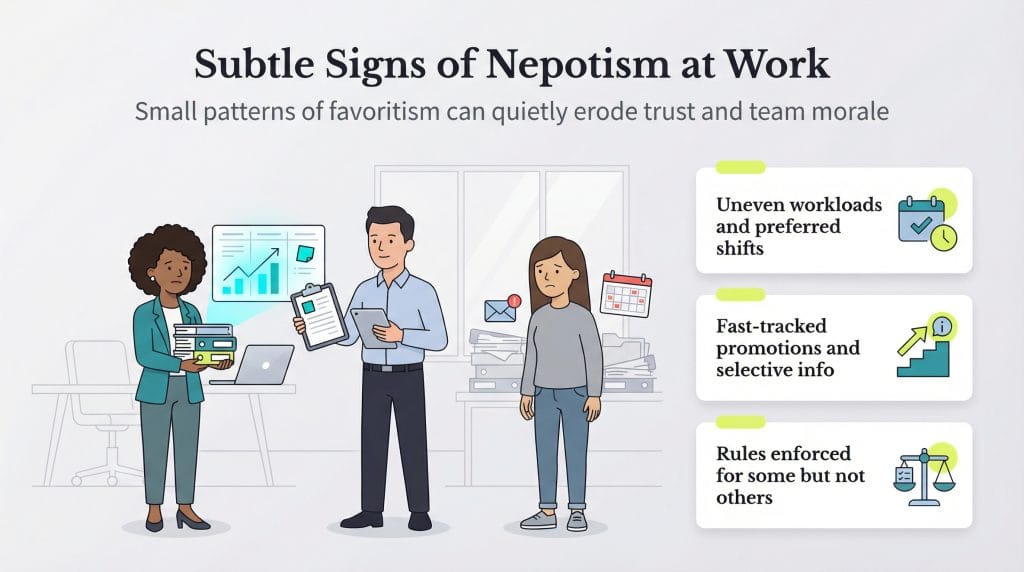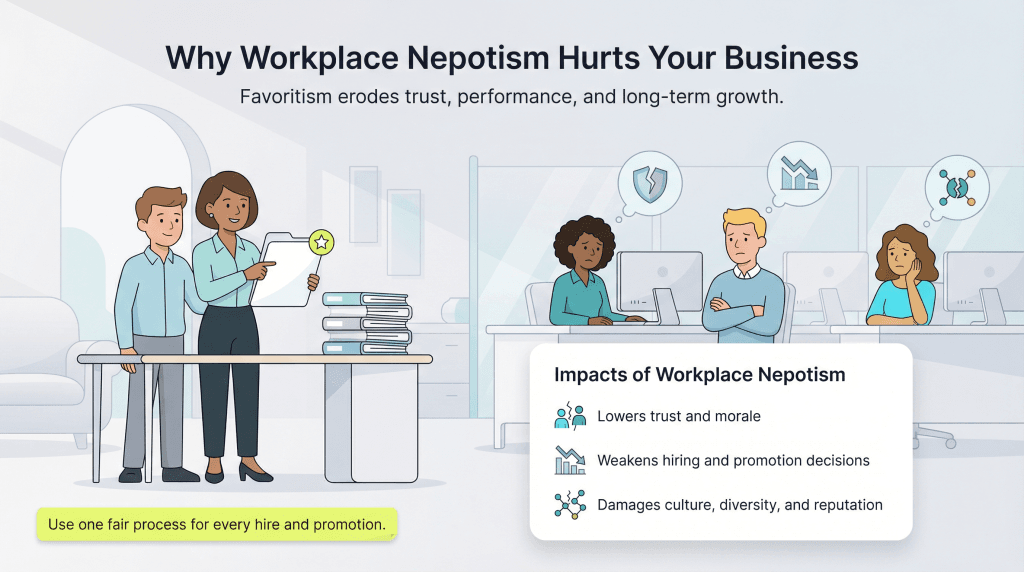Business.com aims to help business owners make informed decisions to support and grow their companies. We research and recommend products and services suitable for various business types, investing thousands of hours each year in this process.
As a business, we need to generate revenue to sustain our content. We have financial relationships with some companies we cover, earning commissions when readers purchase from our partners or share information about their needs. These relationships do not dictate our advice and recommendations. Our editorial team independently evaluates and recommends products and services based on their research and expertise. Learn more about our process and partners here.
Nepotism in the Workplace: What It Is and How to Prevent It
Workplace nepotism can undermine trust, hurt morale and drive good employees away. Here's how to recognize it and stop it before it causes real damage.

Table of Contents
Have you ever worked somewhere that felt unfair? Maybe certain employees seemed to get internal promotions, flexibility or special treatment no matter how they performed, while everyone else had to work twice as hard just to be noticed. That kind of double standard is frustrating and demoralizing. When employees put in the effort and deliver results, they expect to be evaluated on merit. But in some organizations, personal relationships quietly shape hiring and promotion decisions. That practice, known as nepotism, can tilt the playing field and erode confidence in leadership.
Left unchecked, nepotism doesn’t just create resentment. It can damage morale, lower productivity and push formerly highly motivated employees out the door. Understanding how nepotism shows up — and how to prevent it — is key to building a workplace that feels fair, transparent and worth investing in.
What is nepotism?

Nepotism is the practice of giving preferential treatment to relatives or close personal connections, especially when it comes to jobs, promotions or other opportunities. In a workplace setting, nepotism occurs when personal relationships influence hiring, advancement or day-to-day decisions, often at the expense of fairness and business transparency.
That favoritism can take many forms, including:
- Bypassing formal hiring processes
- Awarding promotions or raises without clear justification
- Assigning desirable projects to favored employees
- Offering preferred schedules and flexibility
Erica Salmon Byrne, chief strategy officer and executive chair at Ethisphere, offered a straightforward example: If a hiring manager fills an open role by quietly hiring a family member — without posting the job or considering other candidates — that’s a clear case of nepotism.
Research shows just how common — and impactful — these dynamics can be. Widely cited findings from Opportunity Insights, Harvard’s economic mobility research group, indicate that nearly one-third of Americans will work at the same company as a parent by age 30. In those cases, young workers earn about 20 percent higher wages than their peers without the same connections.
Why is workplace nepotism harmful?

While nepotism isn’t illegal in most private-sector workplaces, it’s widely considered one of the most damaging management practices an organization can allow. Even when favoritism is subtle or unintentional, it can undermine trust, weaken business decision-making and erode company culture.
Research shows how quickly unfairness can take a toll. A study from MIT Sloan Management Review found that employees are more likely to leave because of a toxic workplace culture, especially when they feel excluded or treated unfairly, than because of pay issues. That aligns with iHire’s 2025 Toxic Workplace Trends Report, which found that nearly 75 percent of employees have experienced a toxic workplace, with favoritism cited as a top source of unfair treatment.
Here are some specific ways nepotism can negatively affect a business:
- Putting favored employees in a difficult position: Even employees who benefit from nepotism may struggle. Salmon Byrne noted that co-workers often question whether the person truly earned their role, creating tension, resentment and credibility issues from day one.
- Encouraging poor long-term decisions: Filling roles quickly with familiar faces may feel efficient, but it often sacrifices quality. Skipping a fair, open process can mean missing out on stronger candidates with better business skills or fresh perspectives.
- Limiting access to top talent: Favoritism narrows the candidate pool and makes it harder to build teams based on merit. Over time, this weakens workplace collaboration, knowledge-sharing and employee development.
- Draining the internal talent pipeline: When employees think promotions are already decided, top performers lose motivation or start looking elsewhere. Over time, that makes it harder to develop future leaders from within the company.
- Undermining leadership credibility: Nepotism often places the wrong people in leadership or subject-matter roles. Poor leadership decisions can stall progress, accelerate turnover and create a host of other problems.
- Silencing employees: Healthy workplaces encourage people to speak up, but nepotism discourages that. As Salmon Byrne explained, employees may hesitate to challenge ideas or raise concerns when favored individuals are involved, especially if those individuals have close ties to leadership.
- Damaging brand reputation: Perceived unfairness doesn’t stay internal. Bud Caddell, founder and CEO of NOBL, noted that nepotism is often called out because it’s the most visible form of favoritism. When merit doesn’t align with advancement, employees — and the public — take notice, potentially damaging a brand’s reputation.
- Undermining diversity and increasing legal risk: Nepotism often reinforces homogeneity by favoring people from similar backgrounds. Beyond weakening diversity, equity and inclusion efforts, businesses can run afoul of anti-discrimination laws and face business lawsuits.
How can you prevent nepotism in the workplace?

Preventing nepotism starts with clarity. Employees need to understand that decisions around hiring, promotions and assignments are based on merit, not personal relationships. That requires clear policies, consistent practices and an ethical workplace culture that values fairness and accountability.
Here are several practical ways to reduce the risk of nepotism in your organization.
1. Create a clear anti-nepotism policy.
A written anti-nepotism policy sets expectations from the start. Include it in your employee handbook and review it as part of manager training so leaders understand both the rules and the reasoning behind them.
An effective policy doesn’t have to ban hiring family members outright. Instead, it should require employees to disclose personal relationships that could create conflicts of interest and establish guardrails for how those situations are handled. As Salmon Byrne noted, disclosure helps organizations manage — and avoid — the appearance of favoritism before it becomes a problem.
Many policies go further by limiting how closely related employees can work together. For example, they may prohibit family members from working in the same department or reporting directly to one another.
“It’s not like great, big, giant, enormous policies, but just some written policies that say, ‘Hey, when you come to work here, we expect you to put the company first,'” Salmon Byrne explained. “‘That means that you can’t act in a way that appears to preference your interests over ours, and here are some ways that can happen.'”
2. Maintain clear, detailed job descriptions.
Clear job titles and descriptions are one of the simplest ways to guard against nepotism. When every role has defined requirements, it’s easier to evaluate candidates objectively and hold leadership accountable for hiring and promotion decisions.
Each job description should clearly outline the role’s responsibilities, required experience and expected skills, both technical and interpersonal. This ensures all candidates are measured against the same criteria and helps prevent exceptions or “customized” roles that quietly favor certain individuals.
Well-written job descriptions also make it easier to explain decisions to employees, which reinforces transparency and trust across the organization.
3. Train managers and leaders to recognize and prevent nepotism.
Manager and leadership training play a critical role in preventing nepotism. Policies and job descriptions only go so far if the people making day-to-day decisions don’t understand where the lines are or feel accountable for enforcing them.
Training should clearly define what nepotism looks like in practice, using real-world examples rather than abstract rules. Managers should understand that they’re responsible not only for avoiding favoritism themselves, but also for speaking up when they see it elsewhere in the organization.
Salmon Byrne recommends using storytelling to make those expectations clear. Walking through examples of how nepotism led to poor outcomes, even at peer companies, helps managers and employees understand why these policies exist in the first place.
“Use that storytelling to explain to your employees why you have this policy in the first place and why it’s important that they follow it,” Salmon Byrne said. “And then make it really, really easy for them to tell you when they have a conflict, because so many conflicts can be mitigated by disclosure.”
4. Build a transparent hiring and promotion process.
Transparency is one of the most effective ways to prevent nepotism. When employees understand how hiring and promotion decisions are made, they’re far more likely to trust the outcome even if they’re not the ones selected.
That means clearly documenting advancement criteria, explaining how candidates are evaluated and communicating decisions openly when possible. Decisions about hiring and staffing your business shouldn’t feel mysterious or improvised. If employees don’t understand how decisions are made, they often assume the worst. Clear, transparent processes show that performance and qualifications matter, which reduces anxiety and helps create a healthier workplace.
A transparent process helps reinforce the message that advancement is based on performance and qualifications, not personal relationships. Over time, that clarity strengthens trust, reduces anxiety and supports a healthier workplace culture.
5. Require HR or senior leadership approval for hires and promotions.
Adding an extra layer of review can go a long way toward preventing favoritism. Involving HR or a senior management group in hiring and promotion decisions helps ensure choices are based on consistent, objective criteria, not personal relationships.
HR departments are often well-positioned to spot potential conflicts of interest and ask the right questions before a decision is finalized. For smaller businesses without HR, an extra set of eyes from senior leadership or a neutral group can help keep hiring and promotion decisions fair, particularly for leadership roles.
Caddell emphasized the importance of structured evaluation over individual opinion. “You can build an objective standard that people have to meet, like a scoring criterion that a hiring committee has to stick to, so it’s not just one person’s opinion, and people can’t jump to the front of the line,” Caddell explained.
What are the types of nepotism?
Nepotism doesn’t always look the same. In most workplaces, it tends to fall into one of two broad categories. While both lead to unfair advantages, they’re driven by different motivations.
- Reciprocal nepotism: Reciprocal nepotism occurs when a family member or close connection is offered a role and accepts it because of personal obligations rather than qualifications. That can include financial pressure, loyalty to family, cultural expectations or a desire to preserve relationships. When favoritism goes unchecked, reciprocal nepotism can become “just the way things work.” That makes it harder to draw clear lines around hiring and promotion decisions.
- Entitlement nepotism: Entitlement nepotism happens when someone believes they deserve a job, promotion or special treatment simply because of their relationship to someone in power. This form is most common in family-owned or closely held businesses, where lines between ownership and management can overlap. Employees affected by entitlement nepotism may assume advancement is guaranteed, regardless of performance, which can be particularly damaging to morale and accountability.
What are examples of nepotism (or favoritism) in the workplace?
Nepotism doesn’t always show up as an obvious rule break. More often, it appears as small patterns of favoritism that slowly undermine trust and morale. While these behaviors may seem minor on their own, they can be just as damaging as more blatant misconduct.
Common examples include:
- Uneven workload distribution: Some employees regularly get stuck with the harder or less desirable work, while others are protected from it.
- Selective information sharing: Important updates, feedback or opportunities are shared only with a small group instead of the full team.
- Fast-tracked promotions: An employee moves unusually quickly through the ranks, creating the appearance of merit-based advancement when the outcome was decided in advance.
- Manager favoritism: A manager regularly socializes with the same employees while excluding others, sending a clear (even if unspoken) message about who is valued.
- Problem behavior ignored: Some employees are repeatedly late, have workplace absenteeism issues or make mistakes without consequences, while others are disciplined for the same behavior.
- Preferred project or shift selection: Certain employees are given first choice over assignments, schedules or high-visibility projects, while others have little say.
How nepotism affects the workplace
Nepotism often starts quietly, but the damage adds up fast. When team members think relationships matter more than performance, trust breaks down and employee engagement drops. Over time, that hurts retention and credibility for managers and company leadership.
The good news is that nepotism is preventable. Clear policies, consistent processes and accountable leadership help create a workplace where employees believe effort and results matter. As Caddell put it, “It’s very hard to create a trusting environment with nepotism in place. And without trust, you’re not going to get high performance from your teams.”
For business owners, addressing nepotism isn’t just about avoiding problems — it’s about building a culture people want to stay in and grow with.
Erin Donaghue and Jennifer Dublino contributed to this article.











